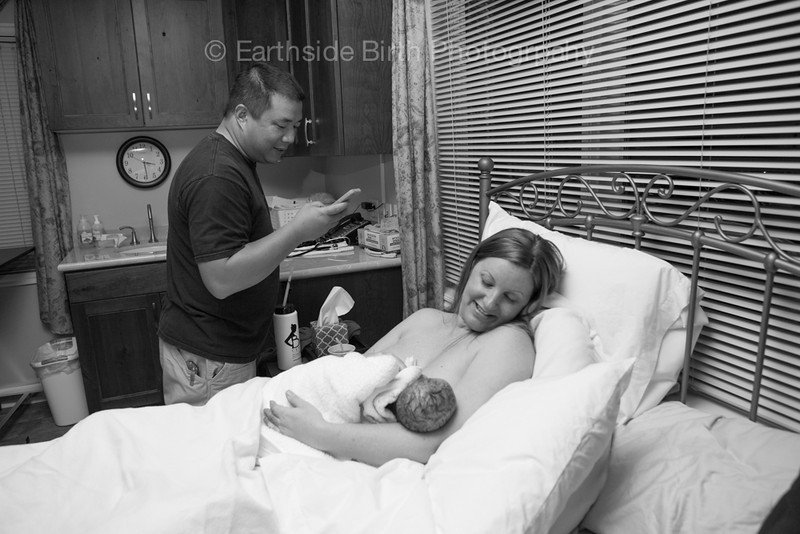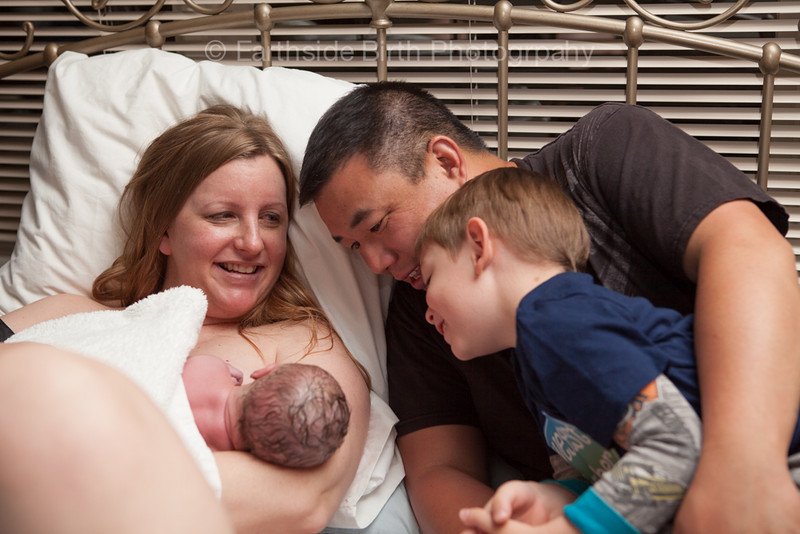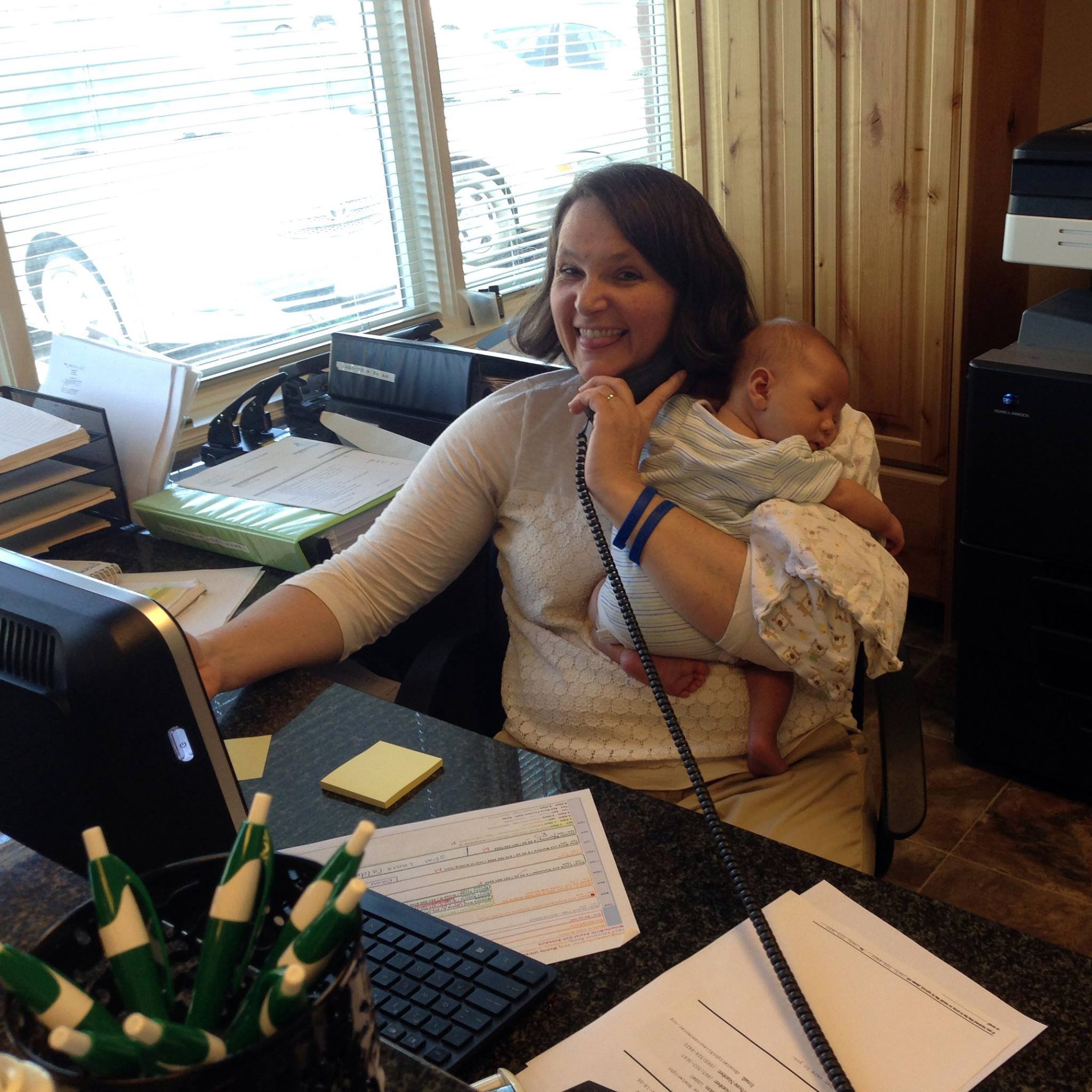Even before I became pregnant with my second baby, I knew I wanted to go a different route when it came to my prenatal care and birth support team. While my experience with my OB and a hospital in 2009 wasn't awful, I felt I got very lucky with supportive nurses when it came to wanting a drug and intervention-free hospital birth for my first son.
Disclaimer: I FULLY understand that there are many aspects to childbirth that are outside of my control, but I am also educated in how the U.S. healthcare system notoriously treats pregnant individuals. I am fully aware of my privilege in that that I had more options when it came to my prenatal team that many in this country. I also fully understand that a birth plan is just that: a plan… not set in stone. Just guidelines on my wishes assuming my body and my baby cooperated.
Prenatal care with my OB was fairly typical for the U.S. maternity system. I often waited thirty minutes to an hour after my scheduled appointment time before seeing my OB for a rushed visit. My weight and blood pressure were scrutinized by a nurse and I had only five to ten minutes with my OB each appointment. She never talked to me about nutrition or exercise, and she relied on me to ask questions to spark any conversations about what she recommended. Thankfully, as I became more and more educated, I came to each appointment prepared with questions, but I often felt like my asking questions was an inconvenience for her.
Also, there were five OBs in the practice. I met with all of them at least one time throughout the course of my pregnancy and learned that only three of them were actually going to be supportive of my leave-me-alone-to-labor-without-intervention birth plans.
I distinctly remember the prenatal visit when I was 34 weeks and we presented our birth plan to my OB (the one I saw most often). My husband joked that it felt like we were watching a teacher grade a test in front of us. :::eye roll::::
She pushed back on a few of the items on our birth plan, but we were prepared for some resistance; especially on me moving freely throughout labor, eating and drinking to maintain my blood sugar and hydration, and preferring intermittent fetal monitoring vs continuous monitoring. We compromised on a few things and I verbally agreed to a couple of things I had no intention of actually following through with.
Some of the things she said about my birth plan should have been red flags:
"I won't let you suffer in agony for hours without pain medication"
“After your water breaks, I don't want you walking around in case the umbilical cord tries to come out first."
When I stated I would prefer to tear than to receive an episiotomy she said, "Well, I'm going to cut your perineum if I think you're about to tear up top, by your urethra." Despite those comments, I was naively confident that we would be fine. That OB was on vacation when I went into labor anyway.
The nurses at the hospital were WAY more supportive and never once asked me if I wanted pain meds. They actually took the time to read my birth plan, dimmed the lights, brought me some cranberry juice, and pretty much left my husband and me alone to do our slow-dancing-labor thing. Immediate skin-to-skin bonding for mama and baby was standard practice too.
When we moved to Utah a few years later and were trying for baby #2, I was afraid we wouldn't get as lucky the second time around. Not wanting to have to interview OBs and research hospitals, or potentially have to find a new OB midway through my pregnancy, I searched for freestanding birth centers in the area. Luckily there was one just twenty minutes from us and that's where our second son, M was born.
It was a completely different experience with my second pregnancy. I have listed some of the biggest and most noticeable differences.
Prenatal Care:
- At my first appointment I sat and chatted with the midwife for almost two hours going over my history; both of us asking questions and getting to know each other. She wanted to know about my pregnancy and birth with TJ and I wanted to know what the criteria would be if complications came up and I "risked out" and had to transfer to an OB. She answered all of my questions thoroughly and never made me feel like she was in a hurry to get to the next patient.
- I turned 35 a few weeks before my first prenatal visit. My midwife noticed and made a point to tell me that I wasn't automatically "high risk" just because I was 35.
- I was due for a pap smear around then too. Given that I'd never had an abnormal pap, my midwife shrugged and said we could wait and do it at my 6-week postpartum visit. My OB insisted I get one when I was 9 weeks pregnant with my first son and it was not pleasant.
- There are toys in the main meeting room at the birth center and there are also a few toys in a drawer of all the exam rooms to keep little ones occupied. When TJ had a random question, my midwife answered him with complete seriousness and even gave the stuffed dog an exam once too. Toward the end of my pregnancy, it was standard procedure for him to get the doppler and measuring tape out of the drawer for her. Once, she even showed him how to find his little brother's heartbeat with a fetoscope.
- At every appointment, I weighed myself, checked my own blood pressure, and I did my own urine test. It became routine that my son helped me into the blood pressure cuff and pushed the button to start the machine. It made him feel like a part of the process and I liked getting to do all of this on my own. When it was time to test for Group B Strep, I did the swab myself too.
- All blood draws were done by the midwife. I never had to go to a separate lab. With my first pregnancy, the lab was down the street from the OB's office and I always had to wait at least thirty minutes before I was seen, even the few times I had an appointment. I can't imagine having to do that with my antsy preschooler with me.
- For my glucose test I didn't have to drink the icky, syrupy drink if I didn't want to. I had a list of options that included an Odwalla mango smoothie or a choice of candy bars. Win!
- Nutrition was discussed a lot. The midwives at my birth center truly believe that good nutrition can help stave off a lot of common pregnancy complications. Taking probiotics was also recommended to me to prevent developing a UTI; a pregnancy complication I had during my first pregnancy that landed me in the hospital. I really believe they worked. I never even caught a cold with my second pregnancy, despite it being cold and flu season AND my oldest starting preschool!
- Prenatal visits were thorough and never, ever rushed. Even when I didn't have any questions to ask and the exam went quickly, my appointments still lasted well over an hour with me chatting about a random aspect of pregnancy or childbirth with my midwife.
Labor and Delivery:
- The birthing room at the birth center didn't look or feel anything like a hospital room even though I know hospital-like equipment was hiding behind cabinet doors if it was needed. The room had a regular bed, an awesome bathroom with a walk-in shower, and a fantastic, big bathtub. I know they had a birthing chair, a hammock to hang from and probably more fun labor-assisting contraptions. The room looked more like a hotel suite than a birthing room. A little part of me wishes my labor was longer so I could have used more of the room.
- While in labor I could wear whatever I wanted. I could walk around and do pretty much whatever felt most comfortable to me. I could be in whatever position I wanted when it was time to push. I only had one cervical exam, and it was done gently and with my consent. I was free to eat and drink as I pleased. My older son was welcome to be present and participate as much as he was comfortable with so long as we had another adult there to supervise him if needed.
- After my baby was born, I didn't have to stay for a mandatory 24-48 hours like I did in the hospital. If I didn't have some postpartum complications, we would have been home within a few hours after birth ready to snuggle with our newborn in our own bed.
Postpartum Care:
· My midwife was prepared for the postpartum hemorrhage I had. A saline IV was started and I was given a couple of drugs to help my uterus stop bleeding. When they weren't working, an ambulance was called and we transferred to the hospital. All of this was done before it became a scary emergency. My midwife came with us to the hospital and stayed well into the morning; even though she didn't have privileges there. She was constantly talking to me, answering my questions, and making sure I understood what was going on and that my mind was at ease.
· My midwife noticed my son had a tongue tie and an upper lip tie within an hour of his birth. She clipped them both the next day and he went on to be a champion nursling with almost zero breastfeeding issues. I learned a lot about tongue ties from her and we discovered that both my older son and I had tongue ties that were never diagnosed. My heart ached a little bit thinking back to how incredibly painful nursing was for me in the early newborn weeks with my oldest.
· I saw my midwife two days postpartum for our first checkup. She did my son's newborn screening and hearing test along with a thorough follow-up for me. We saw her again one week and then two weeks postpartum for more follow-up to make sure that breastfeeding was going well and M's jaundice was under control (it wasn't, long story). In between appointments, she called me to check in and ask how things were going.
· If I had needed it, a home visit with an IBCLC was included in my care. With my first pregnancy, they did the newborn stuff in the hospital and then I didn't see my OB again until six weeks postpartum. She had no idea about our breastfeeding struggles or TJ's jaundice and she probably didn't care. Newborn stuff was for the pediatrician and breastfeeding issues were for a lactation consultant or the pediatrician. Our pediatrician back then never asked how breastfeeding was going either, he only cared that my baby was gaining weight. At my birth center this time, all of it was under my midwife's scope of care and she strived to make sure BOTH of us were doing well.
· At my six-week postpartum check, Eva (birth assistant & office manager) was happy to snuggle with my baby while I had my exam with the midwife. With my OB, my husband had to take a morning off work to come to the appointment with me so he could hold our son while I was examined.
In conclusion, my experience with a midwife at a birth center compared to a hospital with an OB was so vastly different that I will never go back to an OB and a hospital if I have any more babies so long as my pregnancies remain low risk.
Not all women experience their prenatal care the same way I did. I know there are some truly respectful and supportive obstetricians out there. And I'm sure there are some not-so-nice midwives too.
I have learned that the whole attitude of midwifery care is much more to my liking. Midwives tend to treat pregnancies as low risk and normal unless something changes, and they do their best to teach preventative care to mamas to help keep them that way. Most obstetricians don't see pregnancy and childbirth the same way. They tend to see all pregnancies as high risk until proven otherwise.
The second time around, I truly felt cared for and that the health of my baby and myself were the most important things… not what was hospital policy, not the convenience of a doctor, not the wishes of an insurance company. It made my birth experience even more empowering to know this.
Even when I had to transfer to the hospital shortly after my son's birth, my midwife stayed with us and was there to answer my many, many questions. They know and understand the value of psychological healing when things don't go as planned. I can't recommend these wonderful midwives enough!








